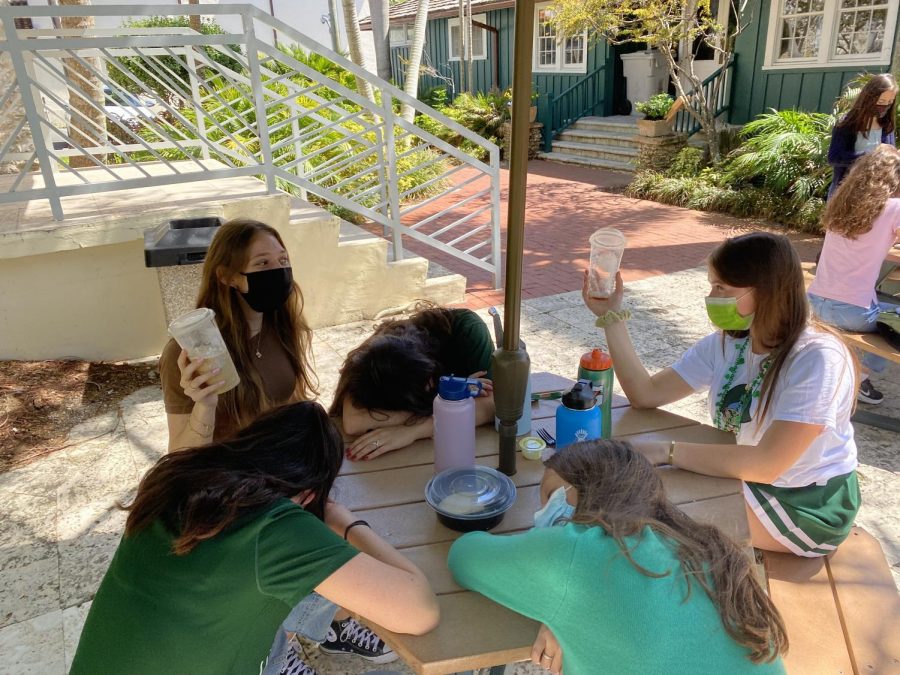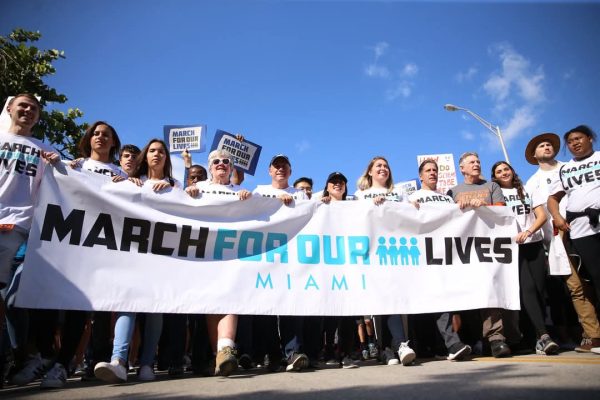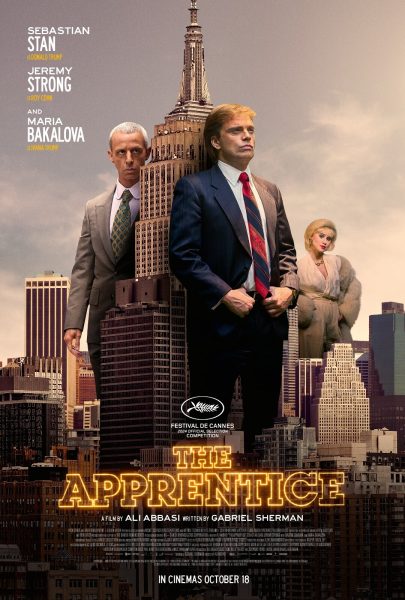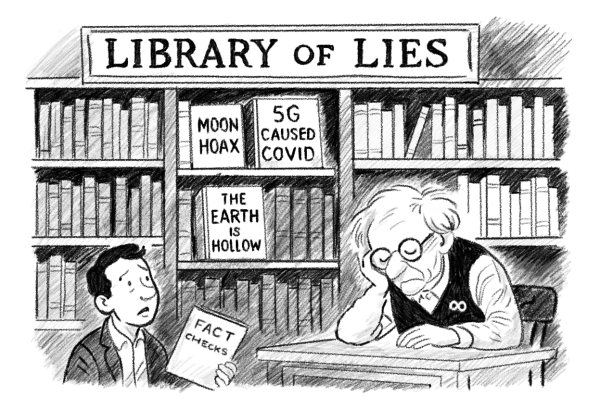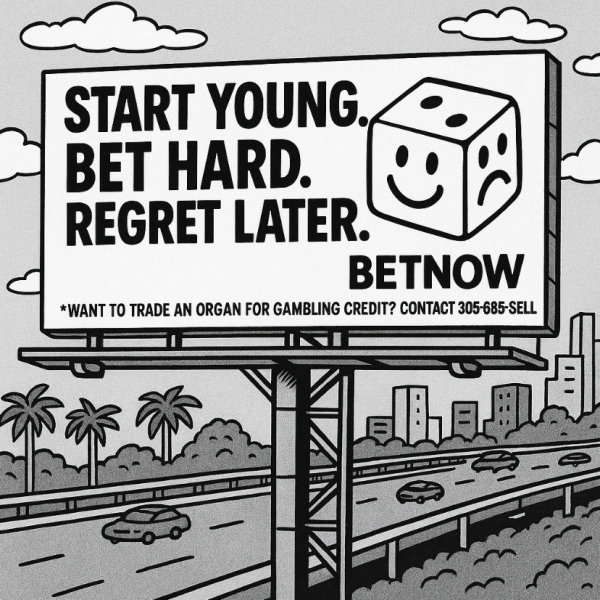Searching for that Caffeine Cure
After running over to Starbucks, seniors Claire Holzman ’21 and Ava Levinson ’21 are re-energized, while their caffeine-deprived peers sleep in the quad.
When I walk onto the campus of Ransom Everglades each morning, I see exhausted students shuffling around the quad or up the stairs to class. When the long lunch break begins, seniors sprint over to Starbucks or Panther Coffee for an afternoon caffeine boost. Often underclassmen can’t resist the allure of a little caffeine and chase after seniors shouting lines like, “If I place a Starbucks order will you pick it up?” As I’ve watched students search for that caffeine cure, I’ve started wondering why coffee—real coffee—is not accessible on RE’s campus.
The famous speech that landed Georgia Crosby ’21 her spot as SGA president for the school year of 2020-2021 was partially founded upon the promise of bringing coffee to school. Thus far, her pro-coffee agenda has resulted in one small step in the right direction: Starbucks Frappuccinos in a bottle at the RE bookstore.
The Frappuccinos have many students thrilled and many students seeing a bright future where various coffee beverages could be sold on campus. Mr. Arthur Hoffmann, the new head of the bookstore, said that he added the Frappuccinos to the shelves of the bookstore as a compromise after getting “requests from students about selling coffee.”
As one of the newest “best-selling items,” Hoffmann noted that there is a “loyal group of 30-40 students who get one every day,” but that the bookstore limits students to one Frappuccino a day. This Starbucks drink contains 90 mg of caffeine per bottle, 10mg less than the recommended daily intake for teenagers. Hoffmann, as someone who doesn’t drink coffee, doesn’t really have a stance on coffee being distributed at school but thinks “the trial is going well so far.”
While I appreciate the Starbucks representation in the bookstore, being an avid coffee drinker myself, I must say: those drinks are simply not coffee. As Sloane Sell ’21 put it perfectly, “They’re pure sugar.” If RE’s administration has not brought coffee to campus because it is supposedly unhealthy for students, then that argument is invalid given the arrival of the Frappuccinos.
Last year, Peri Gould ’21, president of HealthcaRE, pushed for a Keurig machine to be set up in the Pagoda. Her team’s plan was to “have a Keurig with [decaffeinated] teas, but let students know [with the approval of faculty] that they could bring their own coffee to make with the machine.” But these efforts were met with pushback from some members of the administration.
Ms. Isis Perez-Gonzalez, the Director of Counseling, had concerns about HealthcaRE’s plans to set up a Keurig. Ms. PG’s fear was that “coffee is hot,” and that allowing students to casually access this machine could cause “kids to accidentally be burned.” She is not opposed to finding a non-dangerous way of providing coffee, however, as in her view, “Caffeine is actually something that increases your thought process and helps your brain.”
Ms. Jennifer Nero, the Chair of the Humanities Department and an educator who has spent a great deal of time with adolescents, disagreed, saying that sometimes “caffeine is too much” and isn’t the best thing for her students.
Students themselves, however, are overwhelmingly in favor—as are some experts.
Dr. Tyrone Bristol, a pediatrics professor at the University of North Carolina at Chapel Hill School of Medicine and the medical director at UNC Pediatrics at Panther Creek, writes that “Caffeine is a stimulant, and stimulants can help with attention issues… A little bit of coffee can help you be alert to give you a little bit of good mental energy.” According to a 2014 study at Johns Hopkins University, where subjects were given caffeine pills or a placebo and asked to remember a series of images, caffeine can also help with short and long-term memory.
After a cup of coffee, I can pick my head up off my desk and comprehend each word my teacher says, making me confident that I am retaining what is being taught. It is not always about how late or early I fall asleep, but about the midday slump that hinders my chances of absorbing anything my afternoon teachers are saying—and I am not alone.
Lara Semerci ’23 feels “lethargic without a little bit of coffee.” Just one cup a day helps her feel “more alert” in class. Amelia Tovar ’24 drinks coffee every morning before school and would “love to be able to get a cup at school in the afternoon.”
It can even help student athletes. According to Dr. Rick Kattouf, a nutrition expert and the founder of TeamKattouf, an online coaching business, caffeine helps the body use “fat as its primary fuel source, which prevents the body from using glycogen as fuel enabling the athlete to go harder, longer, faster and perform more reps before fatigue.” Sell, a varsity lacrosse player, said she relies on coffee before games. “I always get a coffee or energy drink, so I am alert in games and don’t feel like I’m going to pass out on the field.”
Coach Corey Goff, the Head of Athletics at RE, noted that “small amounts of caffeine are usually not a problem, if the student-athlete is well hydrated, but high sugar drinks like most energy drinks can have detrimental effects on performance and nutrition. Therefore, we do not have energy drinks in the vending machines in the fitness center.”
It is important that students know what caffeine does to their bodies. Dani Ortiz ’21 feels “jittery after a cup of coffee,” so she doesn’t drink caffeinated beverages before volleyball games. Other students like Ava Levinson ’21 don’t “love the feeling of caffeine but love the taste of coffee.” Mr. Eric Lefebvre, a math and computer science teacher, sees the benefits of caffeine and alertness, but recognizes that people must be responsible about consumption. “Some people function well with coffee, some people already have a lot of energy and don’t need it, so it really depends on the student and their family.” Mr. Lefebvre notes that he “100% feels more focused after drinking coffee.”
Still, if a small variety of coffee drinks were sold on campus, students wouldn’t stop for coffee on the way to school, meaning fewer students would show up late to class or speed to get here on time. Students could stay on campus all day and still get a cup of coffee, pumping them up before a test, lecture, or Harkness discussion.
A possible option could be setting up a small coffee cart. Many high schools have been adding makeshift coffee bars to promote drinking milk among teenagers. A company called “Moo Brew” has been setting up coffee kiosks in high schools and promoting their dairy products. The idea is that students will “spend their allowance at school, not at Starbucks.”
The point is, we need coffee, and it would be better to get it here than elsewhere. Not only would having access to coffee on RE’s campus prevent students from leaving school hastily between classes or during lunch; it would also allow more students the opportunity to have a midday pick-me-up before class.


